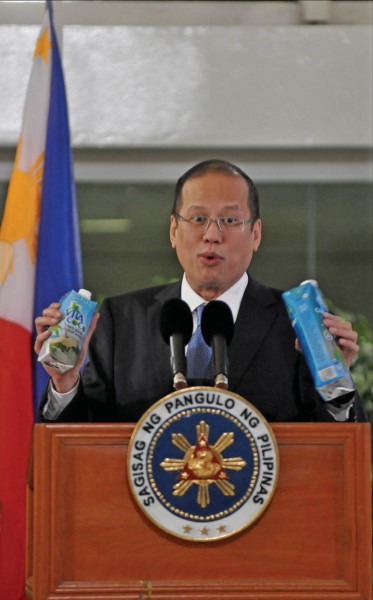Fears aired coco levy fund would go to Hacienda Luisita
Militant groups on Monday urged President Benigno Aquino III to certify as urgent a bill that would establish a trust fund for coconut farmers, fearing the disputed shares of stock of San Miguel Corp. (SMC) worth some P85 billion acquired with the use of a coconut levy would be used to finance the distribution of his family’s Hacienda Luisita.
Kilusang Magbubukid ng Pilipinas (KMP) and the national organization of coconut farmers, Koprahan, said House Bill No. 3443 filed by Anakpawis Representative Rafael Mariano would wrest control of the funds from San Miguel Corp. chairman Eduardo Cojuangco, the President’s uncle.
Similar measures are pending in the Senate.
“If the President is really serious in returning the funds to its real owners, all he has to do is command Congress to enact the small coconut farmers’ trust fund bill,” said KMP deputy secretary general Willy Marbella in a joint statement Monday.
“Declaring the coco levy funds as public funds and setting up a small coconut farmers’ trust fund through HB 3443 is still the best option to free the funds from the control of the President’s uncle,” Marbella said.
Article continues after this advertisementBudget Secretary Florencio Abad and Administrator Euclides G. Forbes of the Philippine Coconut Authority (PCA) earlier said Malacañang could not issue an executive order directing the Presidential Commission on Good Government (PCGG) to free up interests worth P9 billion on the SMC shares for use in the modernization of the coconut industry pending the court’s resolution of the case.
Article continues after this advertisementMarbella admitted that he did not expect Mr. Aquino to certify HB 3443 as urgent, saying “Malacañang has a different agenda on the coco levy funds.”
He cited the statement last week by the National Anti-Poverty Commission (NAPC) that the funds would be used for a so-called antipoverty road map which included “agrarian reform, agro-enterprise development and social protections.”
Hacienda Luisita
The Aquino administration, in preparation for a favorable ruling on the coco levy funds, is thinking of using the money to rehabilitate the coconut industry and ease the lives of some 3.5 million coconut farmers and their families comprising a quarter of the country’s population described as the “poorest of the poor.”
KMP and Koprahan have opposed the plan.
“The Malacañang-NAPC agenda on the coco levy funds is now out in the open, and that is to use our money as payment for the lands of big landlords like Hacienda Luisita of the President’s family,” Marbella said.
He cited reports that following the unanimous decision of the Supreme Court last Nov. 22 calling for the distribution of the 5,000-hectare Hacienda Luisita to its 6,000 farm workers, the Cojuangco-Aquino family was asking the court for P10 billion as “just compensation” for its sugar plantation.
“Using our money to pay landlords is an added insult to the injury inflicted by the government to small coconut farmers,” Marbella said.
‘Sham’ agrarian reform
“[NAPC] Secretary Joel Rocamora should be the first to know that the coco levy funds cannot be used for the government’s sham Carper (Comprehensive Agrarian Reform Program), for payments of so-called just compensation to big landlords, for graft-ridden support services and to finance agri-businesses under the guise of agro-enterprise development,” he said.
“Using the coco levy funds for the antipeasant Carper is highly unacceptable to small coconut farmers. The Aquino government is only inciting small coconut farmers to rise up,” Marbella said.
“We cannot entrust our money to Aquino’s haciendero regime and its cronies who don’t even know how to climb a coconut tree.”
The 700 million SMC shares of stocks comprising 24 percent of the highly diversified food and beverage giant were acquired in 1983 using proceeds of a coconut levy collected for nine years during the Ferdinand Marcos dictatorship. The shares were sequestered following the ouster of Marcos in 1986 and an investigation into alleged ill-gotten wealth of the dictator and his cronies.
In January, the court ruled that the shares belonged to the government, which now must use the funds for the benefit of the farmers beset by poor harvests as a result of aging trees, lack of fertilizers and the impact of climate change.
Hands are tied
Interests and dividends on the fund are deposited in the state-operated United Coconut Planters Bank (UCPB), which has a history of granting questionable loans to San Miguel. In 2009, the financially troubled UCPB secured a P30-billion rehabilitation package from the government.
Recovered ill-gotten wealth of the Marcos and his associates under the law is to be used to fund the agrarian reform program. Since the investigations were conducted, the PCGG had recovered P93.5 billion in alleged illegally acquired assets of the Marcoses and their cronies.
Rocamora, in a phone interview on Monday, said the government had no choice but to defer any action on the ownership of the coco levy funds. Echoing the position of Abad and Forbes, he said the Aquino administration’s hands are tied until the Supreme Court decides on the issue with finality.
“It can’t move until the Supreme Court makes a final decision,” Rocamora said.
He also stressed that the money from the coco levy funds would not be used for the conditional cash transfer scheme critics described as an outright dole that could not lift beneficiaries from poverty in the long term. The plan of the government is to funnel it back to farmers and coconut-growing regions, Rocamora said. With a report from Delfin T. Mallari Jr., Inquirer Southern Luzon
